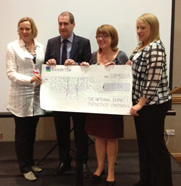While business crime partnerships, like high streets, have been hit by the recession, there is progress, and more call for partnership work than ever, a conference at Milton Keynes heard on September 20. More in the November 2013 print issue of Professional Security.
Lack of an agreed definition of business crime might sound a dry topic, but it matters, as opening speaker Nottinghamshire Police Insp Richard Stones set out. Speaking on behalf of the ACPO business crime portfolio holder Sue Fish, he offered the prospect of an agreed definition adopted by ACPO by Christmas. And that is: ‘any criminal offence that is committed against a person or property that is motivation by the connection of that person or property to a business’. So?! Richard Stones gave the example of a cottage or small business that works out of a back shed. If it’s robbed, a police force might class it as a domestic shed burglary (with a lack of police response), not a business crime. As 43 police forces define business crime differently, a national company cannot count on a consistent approach to the same crime against sites in various counties. Nationally, it means a confused picture of how serious business crime is, which means it might not get the attention it merits. Stones admitted there was work to do beyond a mere definition: “We are trying to turn a battleship and introducing processes which are going to be resisted from elements of the business and partnership community.” Each police force is asked to nominate specific points of contact (SPOCs). But police are demanding of businesses too; Stones proposes businesses and police to share intelligence at force level. Like the police, various business crime partnerships have different data-sharing protocols. Is that best value? Is austerity starting to make us think about a more collaborative approach to business crime? So Stones asked. ACPO is proposing a national standard, the equivalent of an MoT, for crime partnreships to share data with police. The obstacles; each local partnership, even regional ones, in ‘silos’ unable to share data because they deal with data slightly differently. Again, ACPO is proposing a consistent approach to allow sharing of data. But as Stones admitted, many Government bodies (trading standards, VOSA) want to enforce the law but use data slightly differently, hindering co-operation. Working groups to these ends are chaired by among others Barry Millett, national resilience manager at Eon; Phil Collins, head of security at Bernard Matthews; and Paul Broadbent, the former ACPO business crime lead, now chief executive of the Gangmasters Licensing Authority. Police want to harness businesses’ crime data, to (in Stones’ words) tease out ‘the golden nuggets of intelligence that are held by business’.
Pictured left to right, from Crimestoppers, Julia Hughes, regional manager; and Roger Critchell, director of operations; presented with a cheque for £500 by conference organisers Kim Curtis (Cherwell) and Gail Buckland (Milton Keynes)
Photo courtesy of Partners Against Crime, Milton Keynes










